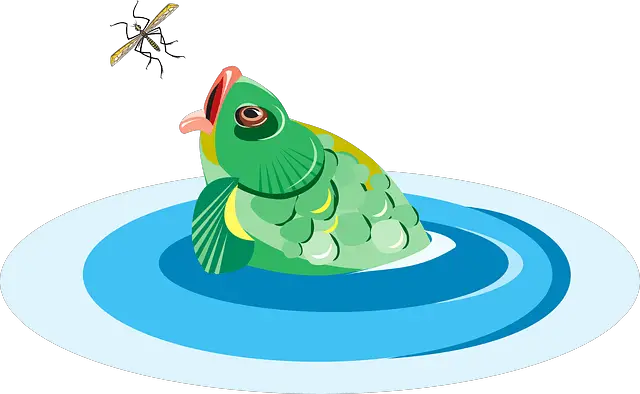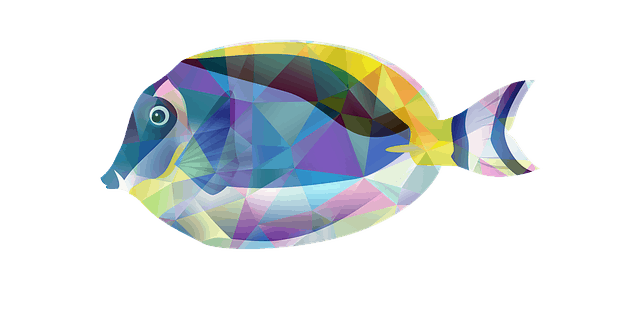All creatures sleep, right? Well, not necessarily. The nature of fish ‘sleep’ has long been an area of interest for many marine biologists as well as aquarium hobbyists. Right now, you may be curious as to what fish do at night (if it isn’t sleep)? Well, I have the answer for you below:
In the absence of light, fish will rest, though they do not ‘sleep’ like land mammals do. Instead, they reduce their activity and lower their metabolism. With their eyes wide open, they will float near the surface, wedge themselves between rocks or plants, or burrow into the sand.
Now that you know fish rest at night to conserve energy, let’s explore this topic further and in more detail. We will discuss whether (or not) fish know the difference between night and day, if they swim while they ‘sleep’, and if they can still detect danger in the darkness?
So, if you’re ready to learn more about the nighttime habits of fish, including those in an aquarium, then let’s get started!
Do Fish Know if its Day or Night?
Fish can sense light and warmth from the sun near the surface of the water. They’re usually more active when it’s bright out, though some species like to take ‘naps’ throughout the day. If you happen to notice them hovering in place for a while, they’re likely resting or napping.
Some fish, however, live so deep down in the water that they can’t tell the difference between day and night as it is always dark at that depth. If they were living closer to the surface, chances are, they would adopt typical day/night swim, eat and sleep behaviours like other fish.
Do Fish Sleep with Their Eyes Open?
Fish don’t have eyelids. Therefore, they ‘sleep’ with their eyes open! As well, many fish will continue to swim while they’re sleeping. Even if you see them floating along the surface, you’ll notice their fins still moving, making them appear to be swimming somewhat.
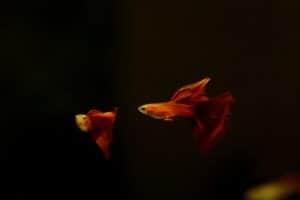
Do Fish Swim While They are Sleeping?
While ‘sleeping’ (which is essentially resting for fish, as they don’t have eyelids to close), most fish continue to move slightly. This is to keep a constant stream of water passing through their gills and maintain sufficient oxygen levels in their bodies.
Larger fish need to keep swimming, albeit at a slower rate, otherwise they would ‘drown’ due to lack of oxygen. Most smaller aquarium fish will hover near the surface, squeeze between rocks, hide amongst plants, or burrow in the sand to ‘sleep.’
How Do I Know if My Fish are Sleeping?
It’s quite easy to tell when fish are ‘sleeping.’ They’ll often lie motionless on the surface of the water. They may even hide in caverns or wedge between rocks in the tank. Some may even lay on the substrate at the bottom the aquarium.
When fish are ‘sleeping’, they are slow to respond to light or movement in the tank, if they respond at all! If you take a closer look at their gills, you’ll notice them ‘breathing’ ever so slowly. This is the result of their metabolisms slowing down.
Do Fish Sleep at the Bottom of the Tank?
Most bottom feeders (like catfish, for example) spend most of their time near the substrate in the tank. As a result, they’ll often sleep in the sand as well. Make sure you recognize the difference between a resting fish at the bottom of your aquarium as opposed to a sick fish laying listless and possibly dying!
Do Fish Need Darkness to Sleep?
Fish, like land mammals, need periods of darkness throughout the day. This helps reduce stress and allows them to conserve energy. As well, too much light in a tank will increase algae growth making the tank look murky and dirty.
Excess amounts of algae can also negatively the health of the fish in an aquarium. It’s usually a sign that there’s too much nitrogen and phosphorous in the water. This can lead to a reduction of oxygen which can cause sickness, even death, in fish.
Can Fish Detect Danger in the Darkness?
Even in the absence of light, fish can still sense danger. Their bodies are lined with rows of pressure-sensitive organs that helps them detect animals or other fish through changes in the water. Fish also have ‘night vision’ which allow them to see in the dark.
How Long Do Fish Sleep?
Fish don’t ‘sleep’ for long. Rather, they take ‘naps’ throughout the day by laying still near the surface of the water or burrowing into the substrate at the bottom. If you haven’t seen them swimming about for a period of time, they are likely resting among plants, between rocks or inside decorations in the tank.
Are Fish Less Active at Night?
Most fish are less active at night. They often associate the absence of light with rest and will use that time to slow down their metabolisms and conserve precious energy. Even though they aren’t as active in the dark, they’re still responsive and can detect danger through changes in water pressure.
What Fish are More Active at Night?
Some fish may appear more active at night, especially if the aquarium lights are too bright. High-powered LED lights can harm the fish’s eyesight and cause them stress. As a result, they may hide or take cover during the day, making them appear to be ‘sleeping’.
Then, when the lights are turned off, they may come out and swim freely as they feel safer and less stressed in the darkness. If you want your fish to be more active during the day, try installing a bubble stone or add some live plants to the tank.
When Do Fish Start to Sleep?
Most fish don’t begin to ‘sleep’ until adulthood. In fact, some species won’t show any signs of sleeping until well into their 20th week of life! Those raised in an aquarium will respond to light and dark by swimming about freely and actively during the day and slowing down or resting at night.
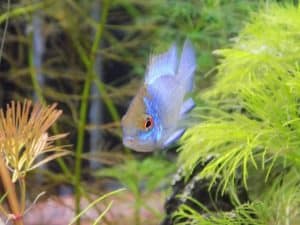
What Do Cichlids Do at Night?
Since cichlids are found in some of the deepest lakes in the world, they require periods of darkness to thrive in an aquarium. In fact, they can do quite well with just surrounding ambient light. All they really need is enough light to see their food at feeding time.
At night, they’ll often hover motionless in an aquarium. They may move a bit and then freeze in place again – eyes wide open – appearing to be hypnotized! When the fish are in this state of ‘sleep’, you can even wave your hand at them and they won’t immediately react as they normally would while awake.
What Do Guppies Do at Night?
At night, guppies will usually stop swimming for awhile and float near the surface in the tank, causing them to appear dead! This natural ‘sleep pattern’ can be confusing for aquarium hobbyists, especially those who are new to fish keeping.
Some guppies prefer to ‘sleep’ by laying motionless on substrate at the bottom of the tank. Others may rest near rocks or between plants in the aquarium. This is vital to their overall health. If they’re kept in a lit aquarium 24 hours a day, they’ll eventually die.
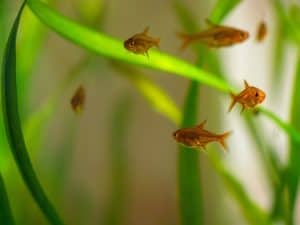
What Do Neon Tetras Do at Night?
Neon tetras will often change colour at night. They tend to lose their brightness when sleeping, which is likely a type of defence mechanism used to ward off unwanted attention from predators. When they’re ‘awake’ and active, they become bright again – if there’s sufficient light and they feel safe in the tank.
Most neon tetras will ‘sleep’ near the bottom of an aquarium. They won’t usually rest on the sand but rather hover just slightly above it. This can sometimes lead to their demise, especially if you have bigger fish grazing near the substrate at night.
Conclusion
To conclude, fish (like land mammals) need ‘sleep’ to survive. In the absence of light, fish will rest to conserve precious energy. In an aquarium, they will usually float near the surface of the water or lay motionless on the sand at the bottom. Sometimes, they will wedge themselves between rocks or plants.
Hopefully, you’ve found this article both interesting and informative. Thanks for reading and happy fish keeping!
Related Aquariums at Home Articles
Do Aquarium Fish Need Darkness?
Do Neon Tetras Need Hiding Places?
Best aquarium lighting for fish color [it’s easier than you think]
Is it Okay to Have a Fish Tank in Your Bedroom?
Can Aquarium Fish See in the Dark to Eat?



